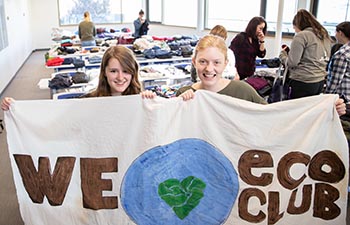Municipal Climate Leadership
Campus climate leadership
Here are some of the big projects and initiatives that TRU is undertaking to demonstrate climate leadership to its community members.

Students take part in TRUSU clubs
The Low Carbon District Energy System
This ambitious 10-year project, which started in 2020 and will see groundbreaking in 2023, will, when complete in 2030, reduce emissions from all campus buildings by 95 percent compared with 2020 levels. This is significant for TRU since the heating and cooling of campus buildings represents the largest emission source that TRU tracks.
Electric vehicle audit
This was completed by a contractor in late 2021 and will help TRU in its decision making when replacing old fleet vehicles with newer ones. The current directive is to only purchase electric vehicles or hybrid vehicles to replace all internal combustion engine (ICE) vehicles. When no suitable or available electric or hybrid is available, then an ICE vehicle will be purchased.
Five-year zero waste plan
This plan is being developed by a consultant and the plan will be released in February 2022. Although TRU does not directly track carbon emissions that result from waste production, it is widely known that all types of organic waste produce methane gas when they end up in a landfill (which is an anaerobic site). Methane is approximately 25 to 30 times more powerful than carbon dioxide. This organic waste includes all pre- and post-consumer food waste, yard waste (which, by weight, is the largest waste stream that TRU produces), along with clothing and textile waste. Besides this, composting most organic waste helps to produce valuable soil amendment.
Bicycle commuting incentive survey
TRU is using the results of a bicycle commuting incentive survey to help inform the next generation of its campus bicycling program. The overall goal of the program is to create the best bicycling commuting incentive program of any Canadian university or college.
Paper use
As a BC public institution, TRU is mandated by the provincial government to report on three specific areas of carbon emissions: natural gas and electricity use in its buildings, fuel used in its fleet vehicles, and the amount of paper it uses. With this in mind, TRU is constantly looking for new or improved paper products or processes used to create paper, as well as methods and programs to reduce the amount of paper that people use on campus.
Personal vehicles for commuting
A significant source of carbon emissions attributed to the day-to-day activities of most universities is the emissions from vehicles that people use to commute to and from campus. This is not something that TRU has direct control of, but it is still something the Sustainability Office is aware of and is taking steps to mitigate. Alternative and active transportation has many facets. Here are some of the programs that the Office is working on: release of a new bicycle program, increased use of transit, bicycle maintenance and safety workshops, increased and improved bike security infrastructure, and participation in commuter challenges.
Three things you can do
1
Get involved. There are many ways individuals can get involved to make a positive difference regarding climate-related initiatives. Ask to join the Environmental Sustainability Advisory Committee or any of its sub-committees (awards, biodiversity, sustainable purchasing, sustainability in the curriculum, zero waste, core them planning). Getting involved can help TRU retain its status as a platinum-rated school under the STARS system.
2
For students, learn about sustainability by taking a sustainability-related course, or join a sustainability or climate change-related TRUSU club.
3
Learn about the sustainability-related initiatives at TRU by setting up a meeting with the staff at the TRU Sustainability Office.
